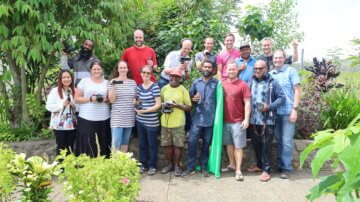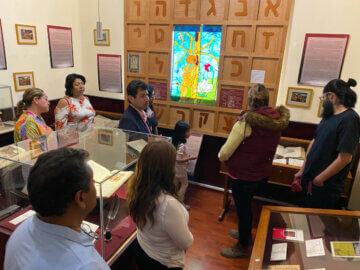Missiological Foundations: Factors Affecting Mission Fulfilment
Synopsis:
The Wycliffe Global Alliance is affected by trends in the Church and the world, through influences of globalization, and other factors. One such factor is marginalization, manifested within the church by the absence of even one Scripture verse in 1700 of the world’s languages, while there are more than 400 English versions of the Bible.
The aim of the Wycliffe Global Alliance through its commitment to Vision 2025 is to see a Bible translated for each language group in the world that needs it. Most people who use these languages are marginalized, because theirs are usually minority languages within a majority context. Marginalized people groups are significant in the missio Dei, and should be given significant attention, from a solid missiological foundation.
The Vision 2025 resolution includes (among others) these missiological implications: an awareness of the ‘pressing need’ that still exists for Bible translation; an acceptance that different attitudes and approaches are needed; a greater emphasis on partnering internally and externally; and openness to new ways of working.
Wycliffe’s founder, William Cameron Townsend, grew up in an era of rapid growth of Bible institutes and faith mission organizations. It was also a time when North American evangelicals believed God had entrusted to them the responsibility of fulfilling the Great Commission. As Wycliffe has become more global in its focus and composition, its leaders have increasingly realized that a North American interpretation and implementation of the Great Commission is not helpful.
Caution is needed in analysing the progress that the Wycliffe Global Alliance has seen in Bible translation. While encouraging to participants, funders and those who pray for the ministry, history shows that progress is often uncertain and at times is an illusion.
Full Article: Article 12 – Missiological Foundations: Factors Affecting Mission Fulfilment
The Wycliffe Global Alliance does not operate in a vacuum. It is positively or adversely affected by trends in the Church and the world, through influences of globalization, and other factors. For example, earlier (Article 8) I explored the theme of marginalization in terms of Jesus’ ministry to the Samaritans. Marginalization within the church is manifested in many ways. One example is the absence of even one Scripture verse in 1700 of the world’s languages, but more than 400 versions/editions/translations of the Bible are available in the English language. This is because resources (people, prayer and finances) have not been released by the Church to engage in this aspect of the missio Dei.
Furthermore, people engaged in cross-cultural ministry in general (and those from Alliance organizations in particular), are familiar with the marginalized because they minister amongst some of the poorest and most neglected people groups on the face of the earth. Alliance personnel are well aware of the sense of inadequacy when faced with such human need.
Influences on Vision 2025
The aim of Wycliffe Global Alliance is to see a Bible translated for each language group in the world that needs it, with a vision to see all the remaining languages have Bible translation started by 2025 (Article 1). Most of the people who use these languages are, by definition, marginalized because their languages are usually a minority language within a majority context.
The ecumenical movement has spoken to the issue of marginalization in its ‘Affirmation of Mission and Evangelism’ document. It acknowledges that mission has gone from the privileged to the marginalized. It understands how past methods “have failed to recognize that mission derives from an understanding of God as the One who is aligned with those consistently pushed to the margins” (CWME 2012:10). Therefore, mission from the margins “seeks to be a countercultural missional movement against missionary approaches and activities which contribute to the oppression, marginalization and the denial of dignity of those on the margins” (CWME 2012:11). This perspective is helpful to the Alliance because it affirms that marginalized people groups are significant in the missio Dei and should, therefore, be given significant attention.
Marginalized people groups are significant in the missio Dei and should, therefore, be given significant attention.
As Wycliffe continues its commitment to Vision 2025, it must also bear in mind the various influences affecting its vision and ensure that an understanding of its vision includes a solid missiological foundation. The Vision 2025 resolution itself has at least nine missiological implications:
- an awareness of the ‘pressing need’ that still exists for Bible translation;
- the adoption of a date as a means of motivating action;
- a realization that working harder is not what is required;
- an acceptance that different attitudes and approaches are needed;
- a focus on building capacity and sustainability is essential;
- a greater emphasis on partnering internally and externally is needed;
- an openness to new ways of working;
- a recommitment to accomplishing the task; and
- an intentional desire to be led by the Holy Spirit (WBTI 1999:5).
Evangelical influences regarding the Great Commission
At this point it is wise to return to what was outlined earlier regarding the theological influences on the formation of Wycliffe, in particular its roots in U.S. evangelical soil. Concomitant with this is the focus on Matthew 28:18-20 as the primary text of the Great Commission (with some influence from Matthew 24:14 and Mark 16:15). Evangelical fervor in the era of Wycliffe’s formation meant Christians saw themselves as responsible for bringing the Great Commission to completion, or at least doing their part to accelerate the mission mandate. Evangelicals believed they played a critical role in what God wanted to do. This led to the thinking of a ‘manifest destiny’ – how God had entrusted to North Americans the responsibility of fulfilling the Great Commission.
"Manifest Destiny": God had entrusted to North Americans the responsibility of fulfilling the Great Commission.
At this writing (2012), it is 13 years since the inception of Vision 2025 and over 70 years since the formation of Wycliffe Bible Translators. As Wycliffe has become more global in its focus and composition, its leaders have increasingly realized that this North American interpretation and implementation of the Great Commission is not accurately helpful. For example, the Vision 2025 resolution acknowledges that working harder (in the sense of a Western Protestant work ethic) or “doing more of what we are now doing” (WBTI 1999:5) will not accomplish the Vision.
The sense of urgency depicted in the resolution with the specific reference to the year 2025 does have a hint of Mark 16:15 (“the gospel will be preached to the nations and then the end will come”). This is especially true if people use the year 2025 as an eschatological reference point to Jesus’ return and the ushering in of the end of the age as we know it now. However, to make this connection is a serious misreading of the Great Commission texts as well as a trivialization of the complexity of Bible translation into the world’s vernaculars.
Nevertheless, the focus of a particular year against the backdrop of the Great Commission texts does provide a needed sense of urgency since the texts themselves clearly imply that urgency. In fact they provide a biblical basis for this opening statement of the resolution, “motivated by the pressing need…” (WBTI 1999:5).
Lingering effects of ‘manifest destiny’
As has already been pointed out, Wycliffe’s founder William Cameron Townsend grew up in an era of the rapid growth of Bible institutes and faith mission organizations. This was also the zenith of ‘manifest destiny’ and therefore it is worth exploring to see if this philosophy continues to affect the Alliance.
In Article 2, I noted Townsend’s struggle of accepting non-Westerners into Wycliffe’s ministry. He seemed to believe that if he allowed this proliferation of nationalities, the U.S. church would ignore its responsibility for involvement in Bible translation. This makes perfect sense, given Bosch’s observation: “virtually every white nation regarded itself as being chosen for a particular destiny” (Bosch 1991:299).
Another factor was the optimism of the early 20th century as expressed through the Edinburgh Missionary Conference 1910. For example, chairman John R. Mott boldly proclaimed that a “conquest” to the ends of the earth by world mission had begun (Walls 2008:200), resulting in the world being completely “reached” in the foreseeable future (Noll 2012:264). Who could have foreseen, then, that the first half of that century would witness three cataclysmic events: World War I (1914-1918), the Great Depression (1929-1933) and World War II (1939-1945)? Fallout from these events impacted such optimism in many ways, including erosion of both the influence of colonialism and over-confidence in humanity rooted in the Enlightenment.
Whenever the church (and mission agencies) sounds exuberant or triumphant about the progress of the evangelization of the world, this should serve as a warning.
The lesson for us is that whenever the church (and mission agencies) sounds exuberant or triumphant about the progress of the evangelization of the world, this should serve as a warning. We will be wise to look back in history and be reminded of periods of expansion of the gospel followed by periods of recession. Andrew Walls is especially notable in his analysis of church history being a serial progression, rather than one of conquering and holding new territory.
Consequently some degree of caution is needed in analysing the progress that Wycliffe Global Alliance has seen in Bible translation (in terms of languages entered, works started, New Testament or full Bibles translated, number of new literates, etc.). Progress is encouraging to the participants, the funders and those who pray for the ministry, but history shows that progress is always uncertain and at times is an illusion.
The latest
View all articles
03/2024 Pacific: Papua New Guinea
Informing, teaching, inspiring: PNG workshop teaches video storytelling for language communities
PNG workshop teaches video storytelling for language communities
Read more
02/2024 Global
Looking ahead at 2024
As the year unfolds, we marvel at the work of God in our rapidly changing world. And, we look forward to a number of gatherings and conversations intended to draw us together.
Read more
01/2024 Americas
Telling the Bible's Story
It may come as a surprise that a museum is among the Wycliffe Global Alliance organisations.
Read more